Charles E W Bean, Diaries, AWM38 3DRL 606/1/1 - October - December 1914 - Part 13
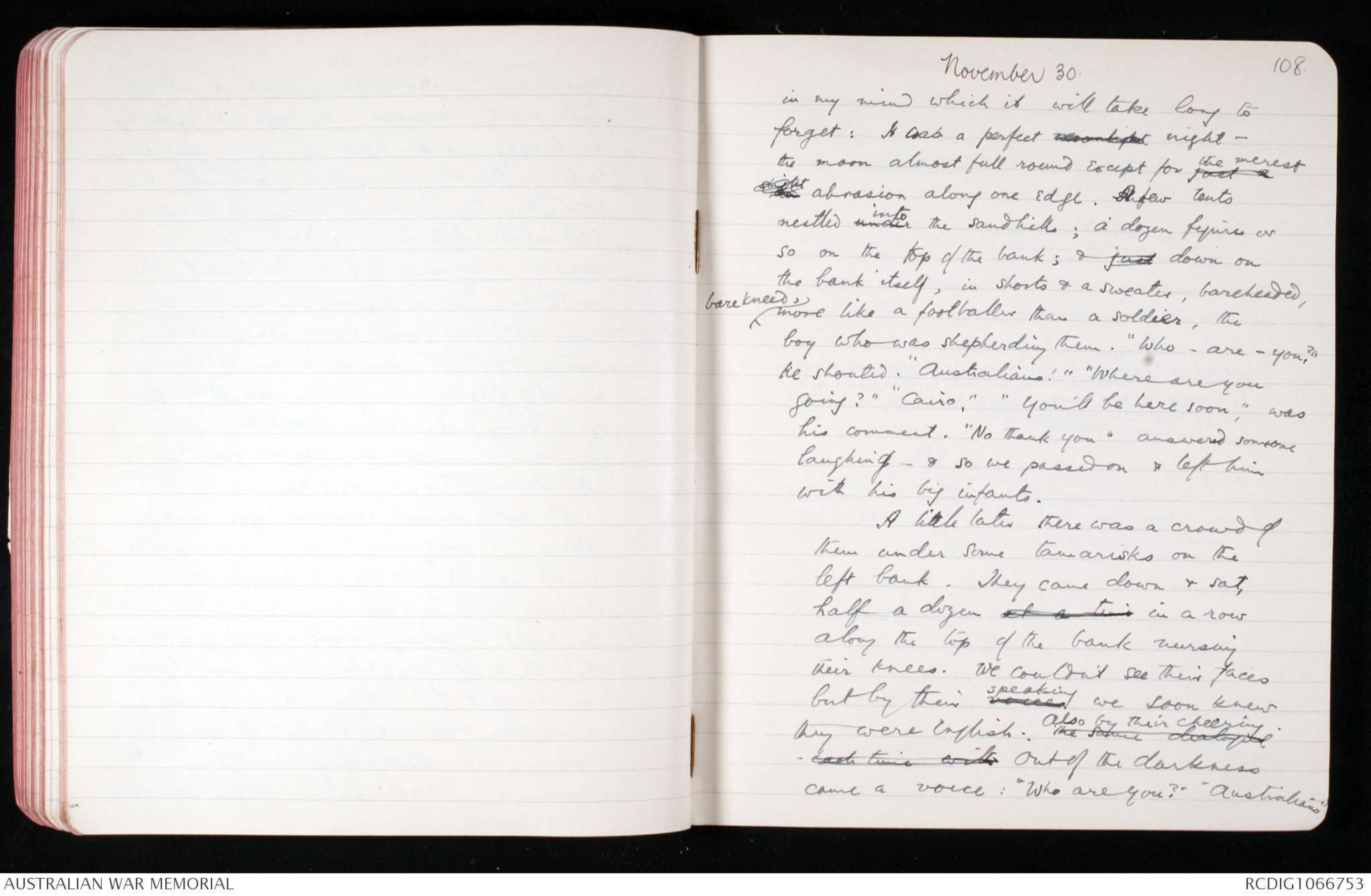
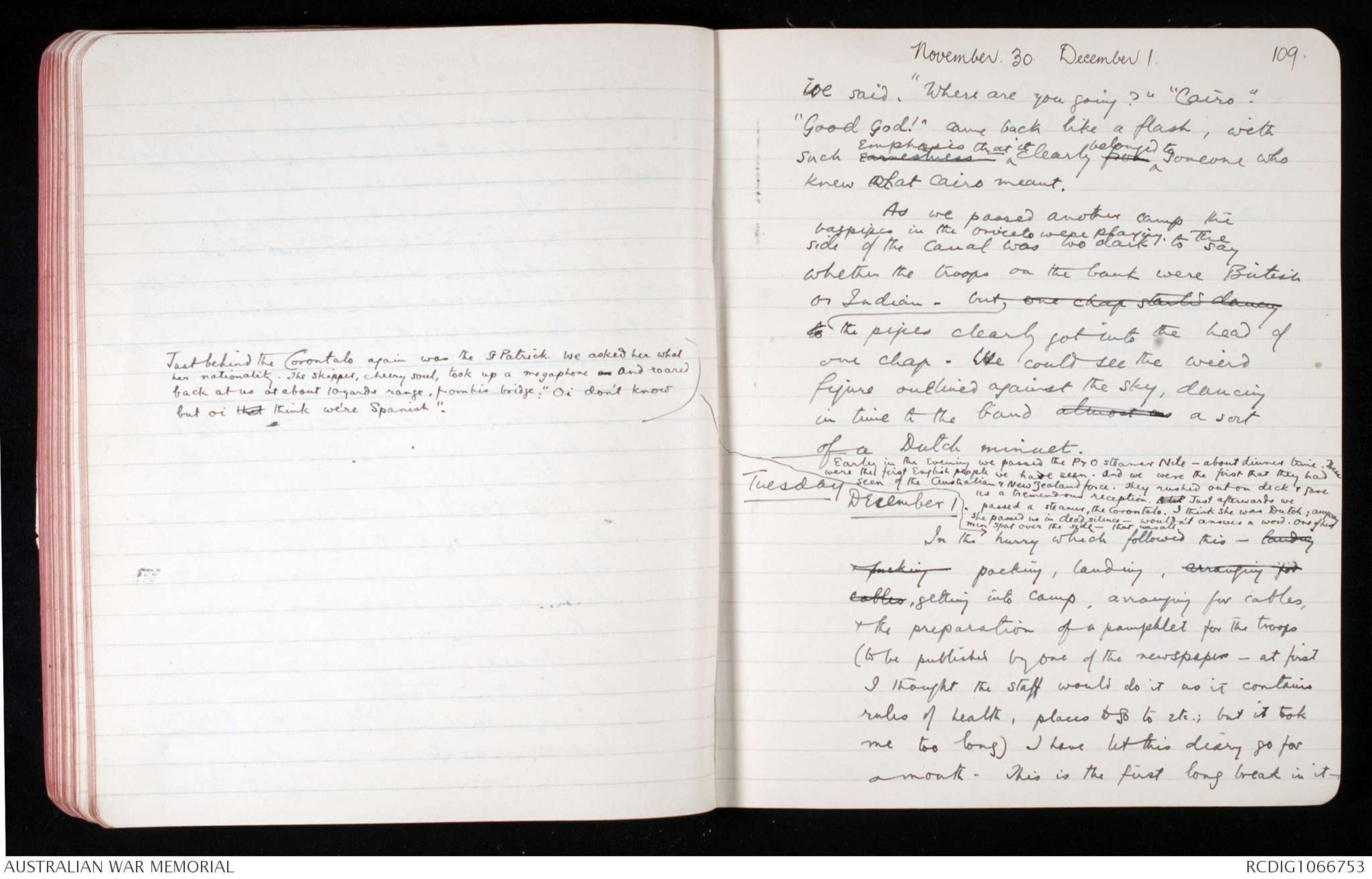
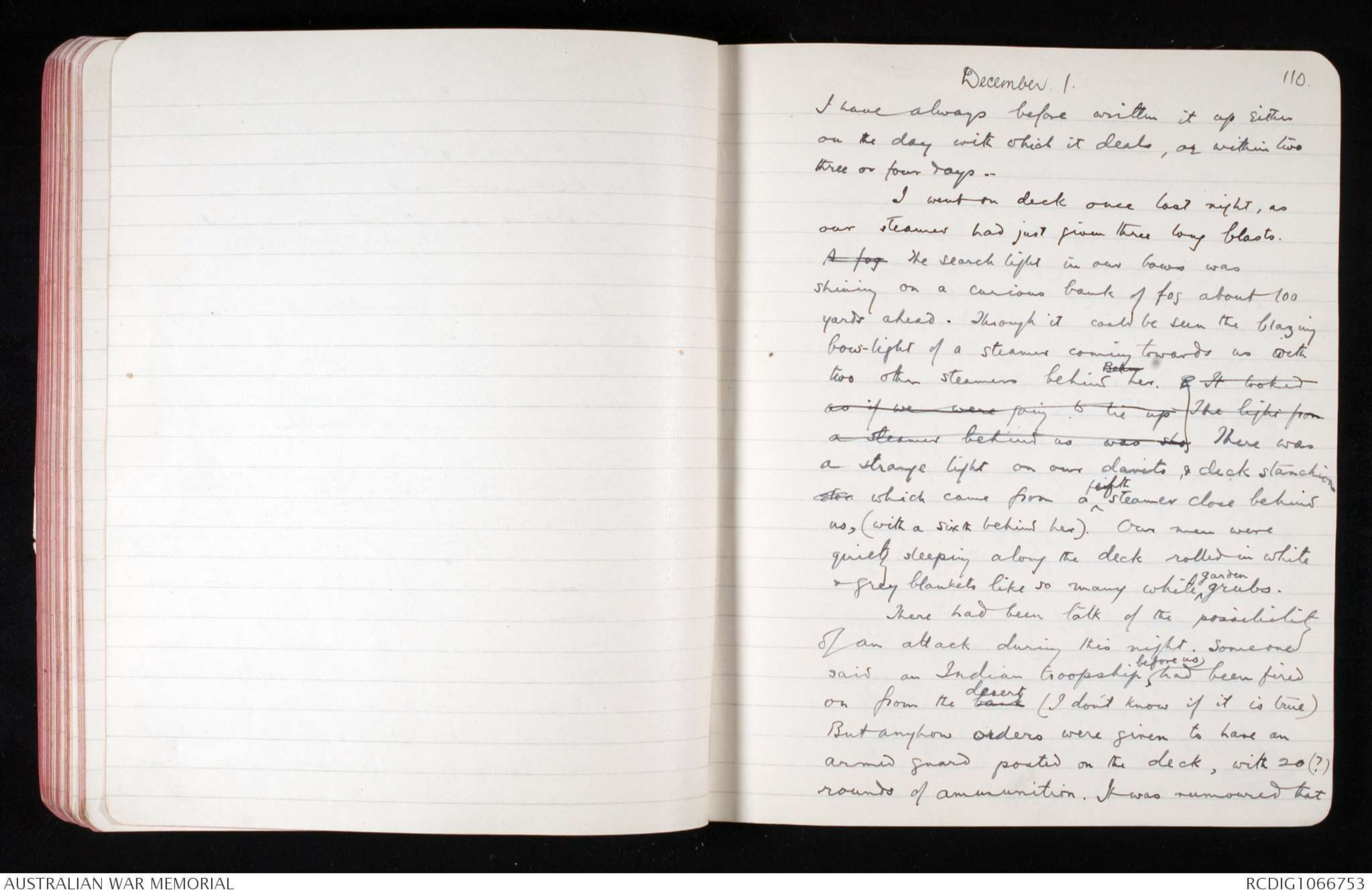
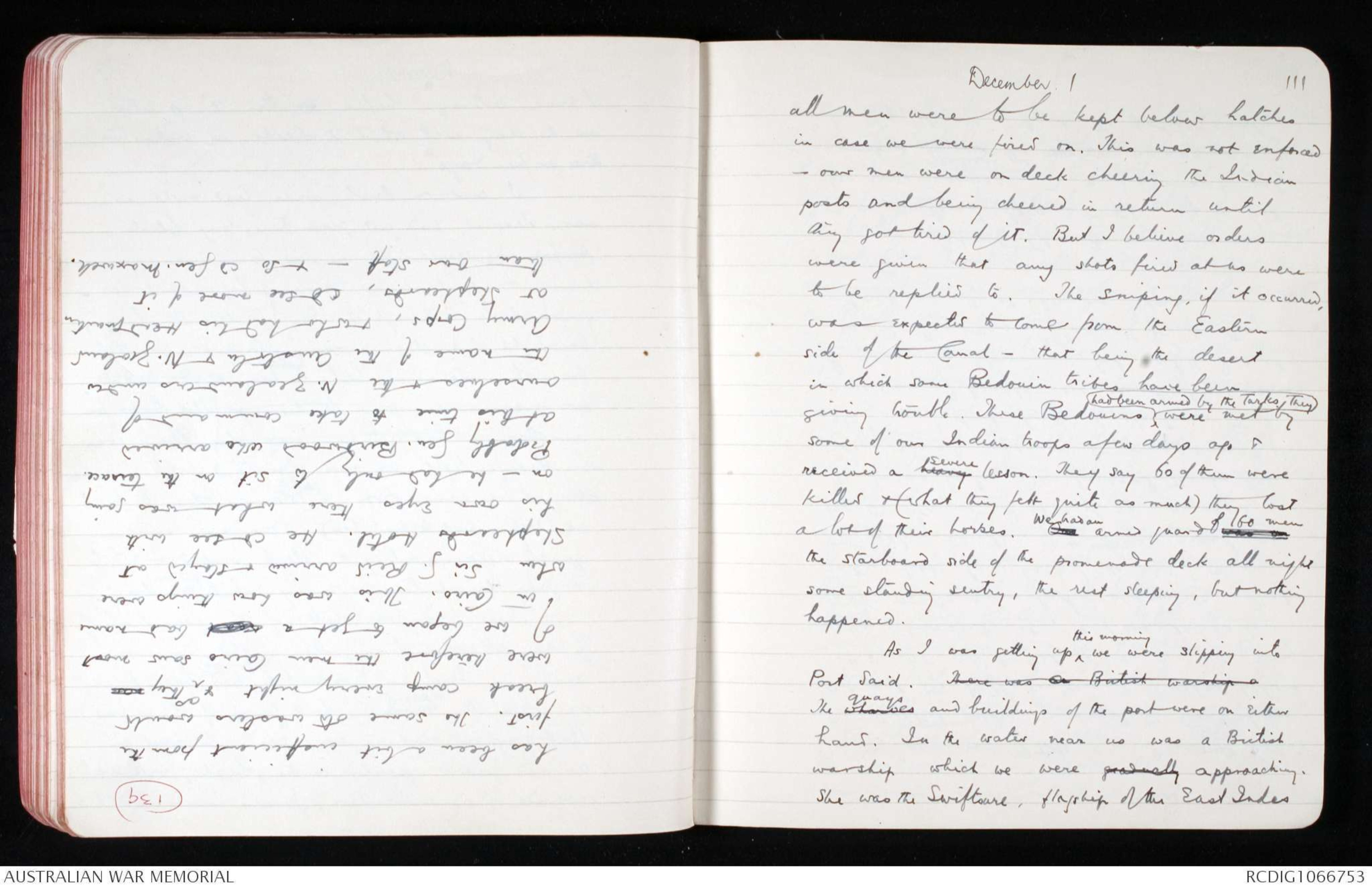
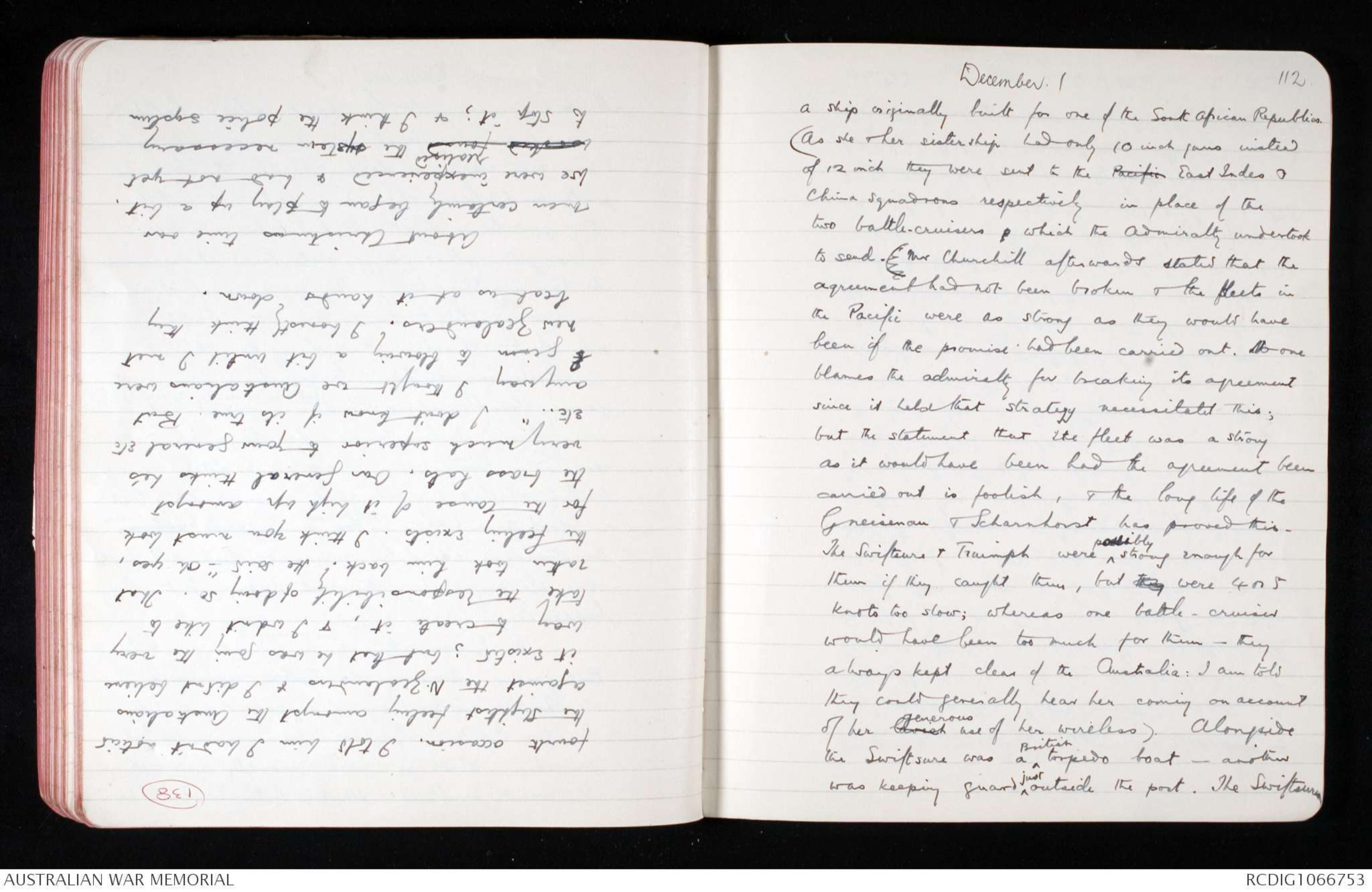
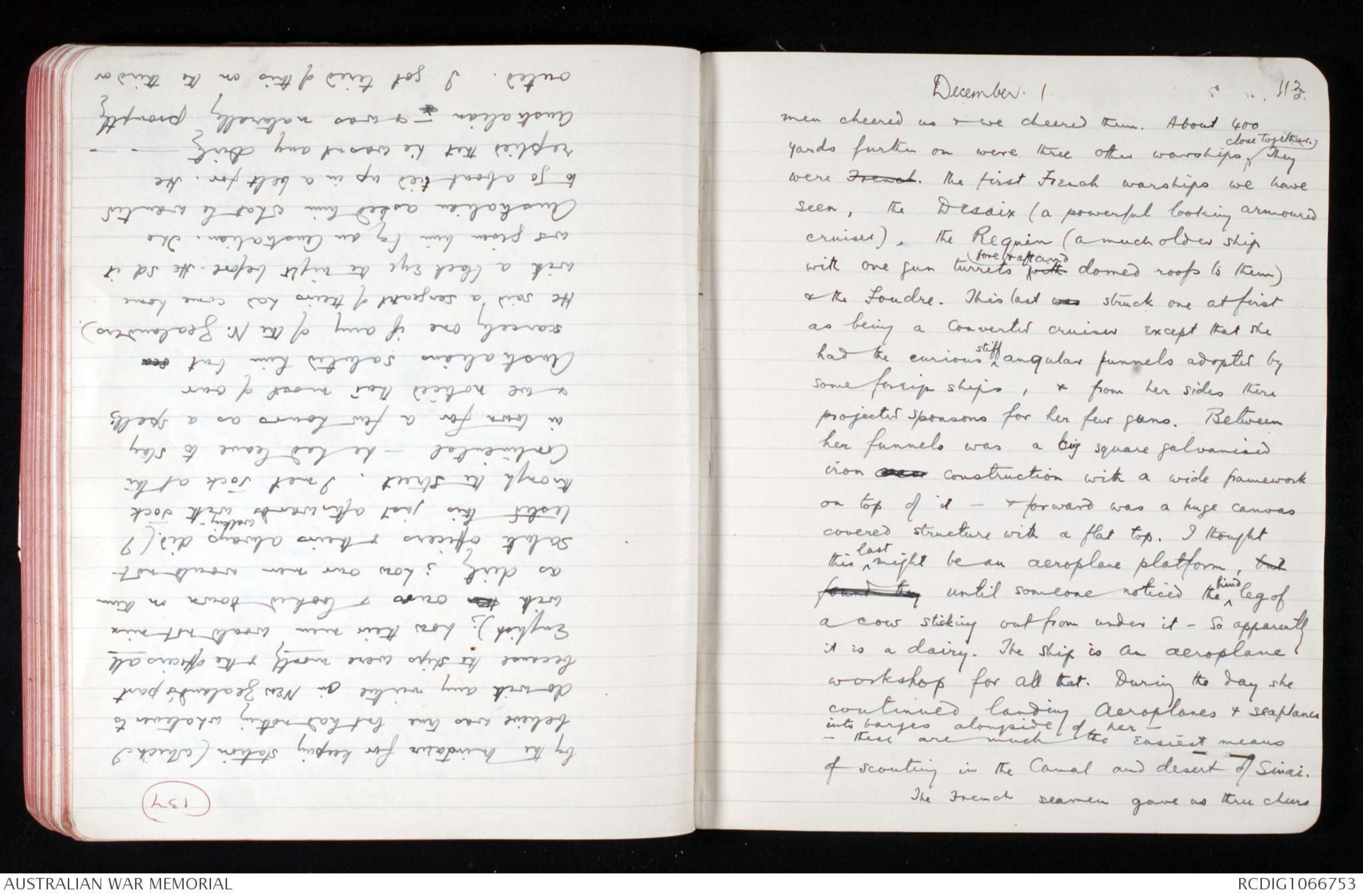
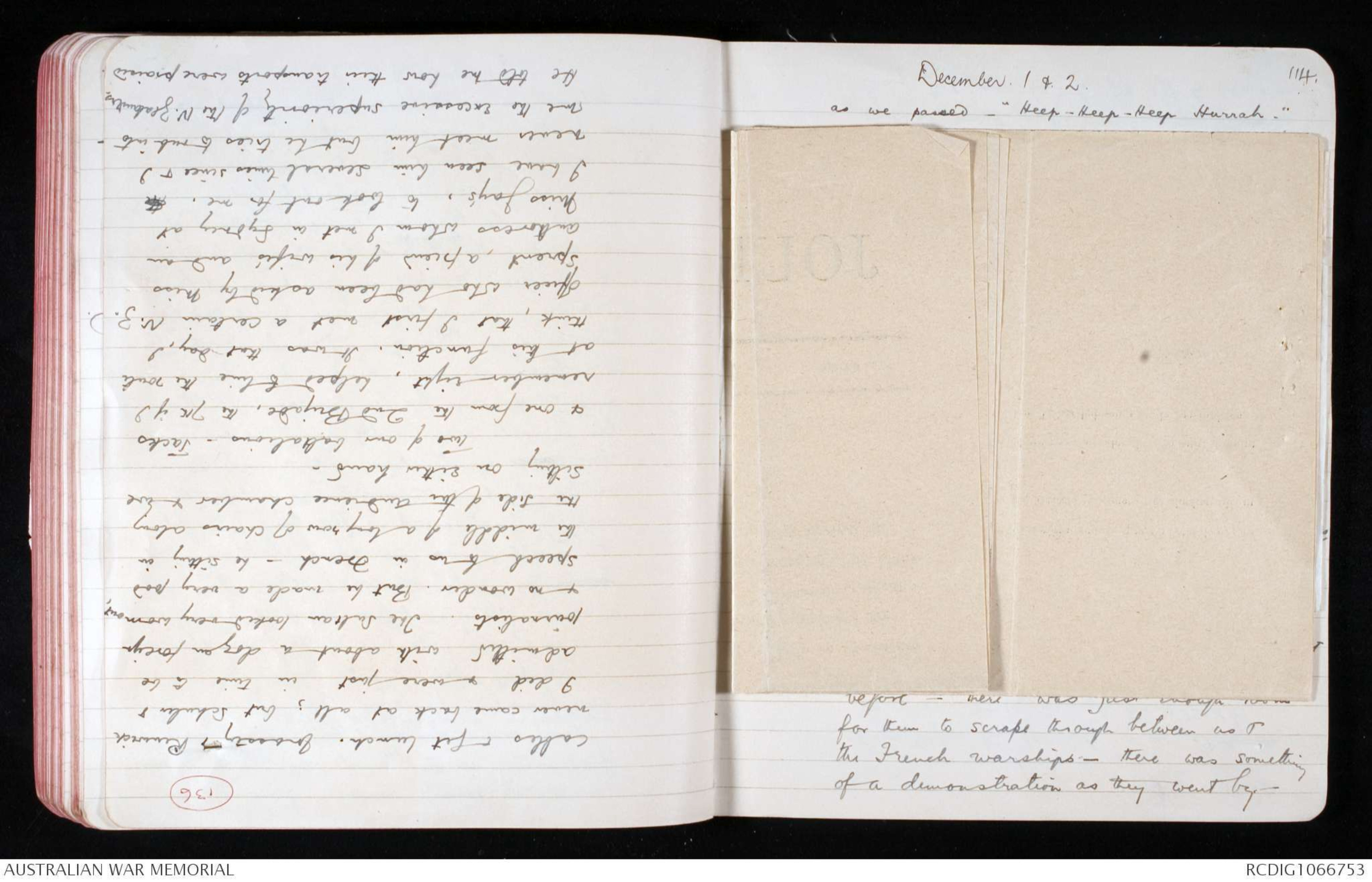
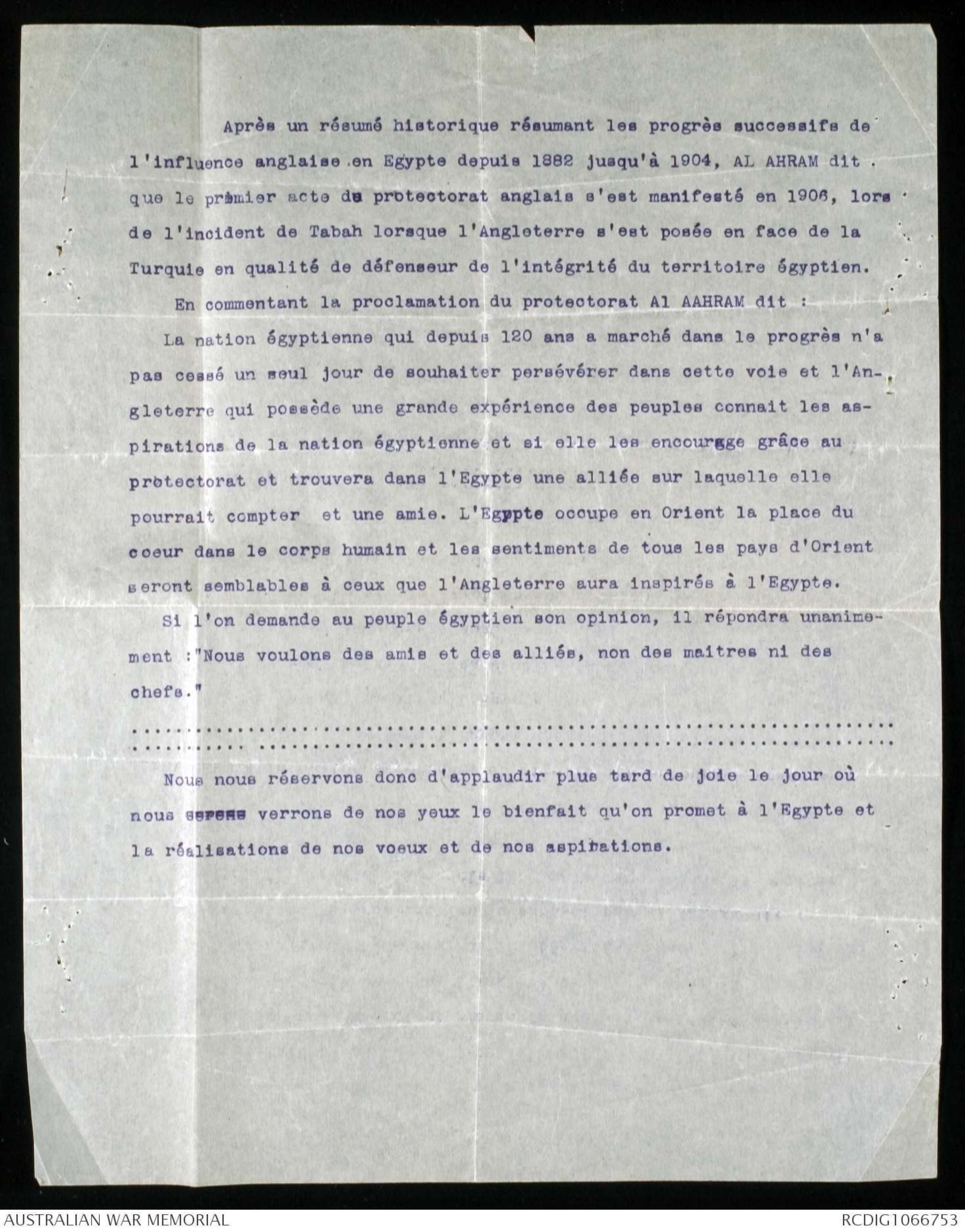
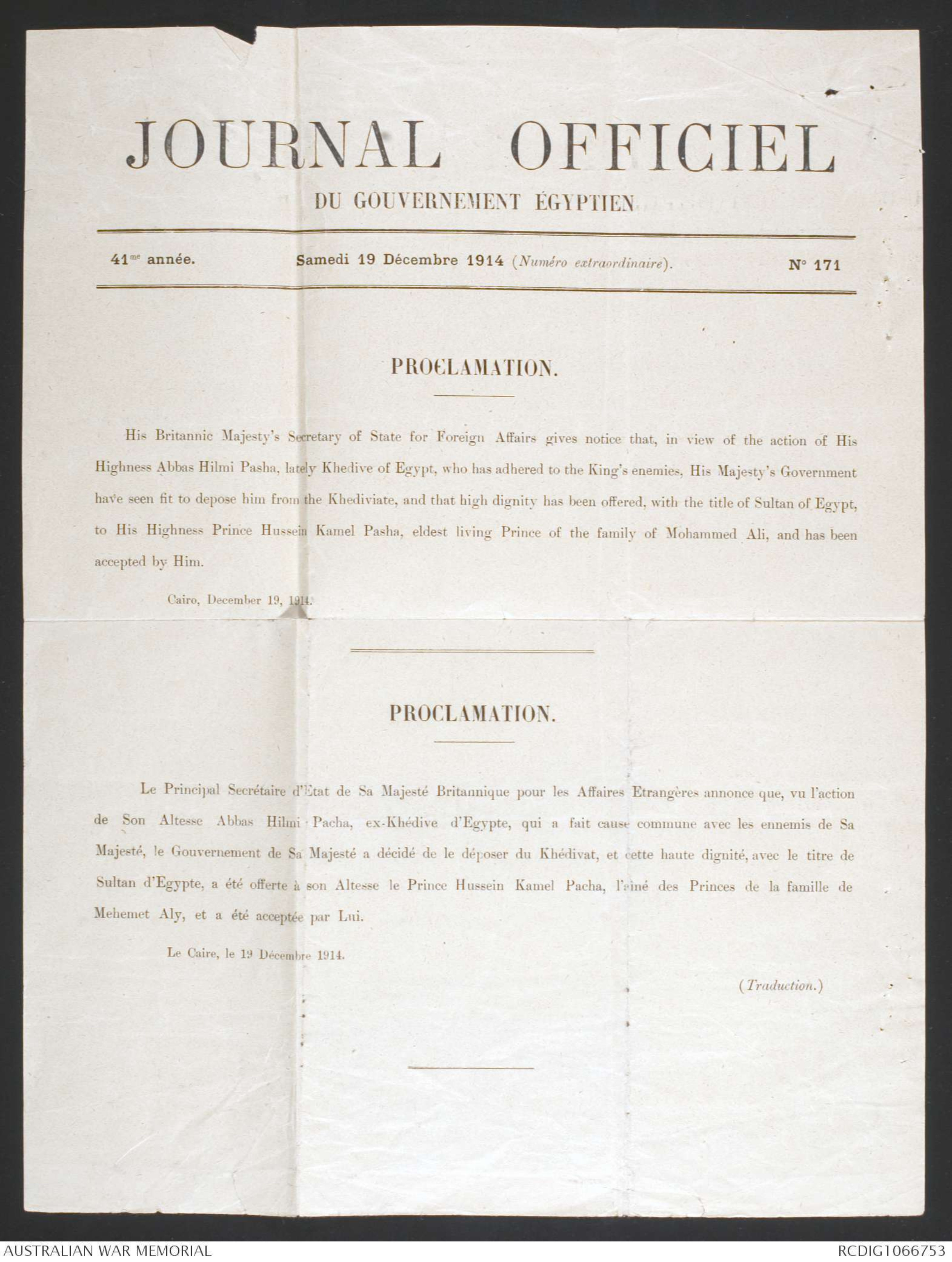
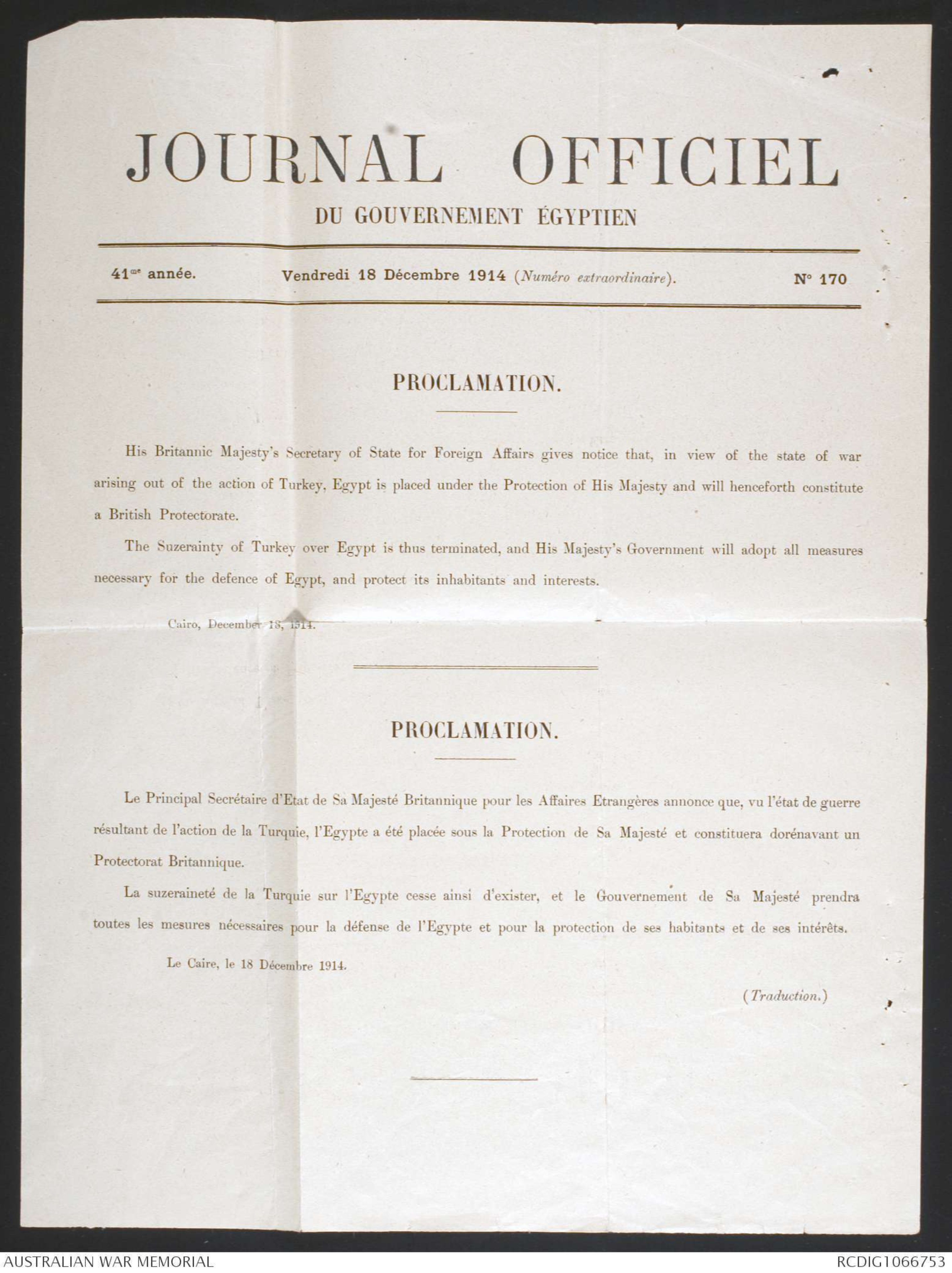
108
November 30.
in my mind which it will take long to
forget: It was a perfect moonlight night -
the moon almost full round except for just a the merestlight abrasion along one edge. A few tents
nestled under into the sandhills; a dozen figures or
so on the top of the bank; & just down on
the bank itself, in shorts & a sweater, bareheaded,
^bare kneed, more like a footballer than a soldier, the
boy who was shepherding them. "Who - are - you,?"
he shouted. "Australians!" "Where are you
going?" "Cairo," "You'll be here soon," was
his comment. "No thank you" answered someone
laughing - & so we passed on & left him
with his big infants.
A little later there was a crowd of
them under some tamarisks on the
left bank. They came down & sat,
half a dozen at a time in a row
along the top of the bank nursing
their knees. We couldn't see their faces
but by their voices speaking we soon knew
they were English. The same dialogue Also by their cheering.
- each time with. Out of the darkness
came a voice: "Who are you?" "Australians"
November. 30. December 1. 109
We said. "Where are you going?" "Cairo".
"Good God!" came back like a flash, with
such earnestness ^emphasis that it clearly put ^belonged to someone who
knew what Cairo meant.
As we passed another camp the
bagpipes in the orvieto were playing. The
side of the canal was too dark to say
whether the troops on the bank were British
or Indian - but one chap started dancingto the pipes clearly got into the head of
one chap. We could see the weird
figure outlined against the sky, dancing
in time to the band almost on a sort
of a Dutch minuet.
Early in the evening we passed the P & O steamer Nile - about dinner time. These
were the first English people we have seen. And we were the first that they had
seen of the Australian & New Zealand force. They rushed out on deck & gave
us a tremendous reception. A lot Just afterwards we
passed a steamer, the Corontalo. I think she was Dutch; anyway
she passed us in dead silence - wouldn't answer a word. One of her
men spat over the side -that was all.
∧ Just behind the Corontalo again was the St Patrick. We asked her what
her nationality. The skipper, cheery soul, took up a megaphone on and roared
back at us at about 10yards range, from his bridge: "Oi don't know
but oi that think we're Spanish".)
Tuesday December 1.
In the hurry which followed this - landing& packing packing, landing, arranging forcables, getting into camp, arranging for cables,
& the preparation of a pamphlet for the troops
(to be published by one of the newspapers - at first
I thought the staff would do it as it contains
rules of health, places to go to etc.; but it took
me too long) I have let this diary go for
a month. This is the first long break in it -
December 1. 110
I have always before written it up either
on the day with which it deals, or within two
three or four days ..
I went on deck once last night, as
our steamer had just given three long blasts.A fog The search light in our bows was
shining on a curious bank of fog about 100
yards ahead. Through it could be seen the blazing
bow-light of a steamer coming towards us with
two other steamers behind Before her. E It lookedas if we were going to tie up. The light froma steamer behind us was sho There was
a strange light on our davits, & deck stanchionsstan which came from a ^freight steamer close behind
us, (with a sixth behind her). Our men were
quietly sleeping along the deck rolled in white
& grey blankets like so many white ^garden grubs.
There had been talk of the possibility
of an attack during the night. Someone
said an Indian troopship ^before us had been fired
on from the bank desert (I don't know if it is true)
But anyhow orders were given to have an
armed guard posted on the deck, with 20 (?)
rounds of ammunition. It was rumoured that
(139)
has been a bit inefficient from the
first. The same old wasters would
break camp every night & ∧as they now
were therefore the men Cairo saw most
of we began to get a real bad name
in Cairo. This was how things were
when Sir G. Reid arrived & stayed at
Shepherds Hotel. He cd see with
his own eyes there what was going
on - he had only to sit on the terrace.
Probably Gen. Birdwood who arrived
at this time to take command of
ourselves & the N. Zealanders under
the name of The Australian & N. Zealand
Army Corps, & who had his Head Quarters
at Shepherds, cd see more of it
than our staff - & so cd Gen. Maxwell.
December. 1 111
all men were to be kept below hatches
in case we were fired on. This was not enforced
- our men were on deck cheering the Indian
posts and being cheered in return until
they got tired of it. But I believe orders
were given that any shots fired at us were
to be replied to. The sniping, if it occurred,
was expected to come from the Eastern
side of the Canal - that being the desert
in which some Bedouin tribes have been
giving trouble. These Bedouins ^had been armed by the Turks. They were met by
some of our Indian troops a few days ago &
received a heavy severe lesson. They say 60 of them were
killed & (what they felt quite as much) they lost
a lot of their horses. Our We had an armed guard of was on 60 men
the starboard side of the promenade deck all night
some standing sentry, the rest sleeping, but nothing
happened.
As I was getting up ^this morning we were slipping into
Port Said. There was a British warship a
The wharves quays and buildings of the port were on either
hand. In the water near us was a British
warship which we were gradually approaching.
She was the Swiftsure, flagship of the East Indes
(138)
fourth occasion. I told him I hadn't noticed
the slightest feeling amongst the Australians
against the N. Zealanders & I didnt believe
it existed; but that he was going the very
way to create it, & I wdn't like to
take the responsibility of doing so. That
rather took him back. He said - "Oh yes,
the feeling exists. I think you must look
for the cause of it high up amongst
the brass hats. Our general thinks he's
very much superior to your general etc
etc.." I don't know if its true. But
anyway I thought we Australians wereE given to blowing a bit until I met
New Zealanders. I honestly think they
beat us at it hands down.
About Christmas time our
men certainly began to play up a bit.
We were inexperienced & had not yetworked found realised the system necessary
to stop it; & I think the police system
December. 1 112
a ship originally built for one of the South African Republics.
(As she & her sistership had only 10 inch guns instead
of 12 inch they were sent to the Pacific East Indes &
China squadrons respectively in place of the
two battle-cruisers p which the Admiralty undertook
to send. ( Mr Churchill afterwards stated that the
agreement had not been broken & the fleets in
the Pacific were as strong as they would have
been if the promise had been carried out. No-one
blames the admiralty for breaking its agreement
since it held that strategy necessitated this;
but the statement that the fleet was a strong
as it would have been had the agreement been
carried out is foolish, & the long life of the
Gneisenau & Scharnhorst has proved this.
The Swiftsure & Triumph were ^possibly strong enough for
them if they caught them, but they were 4 or 5
knots too slow; whereas one battle-cruiser
would have been too much for them - they
always kept clear of the Australia: I am told
they could generally hear her coming on account
of her lavish generous use of her wireless). Alongside
the Swiftsure was a ^British torpedo boat - another
was keeping guard ^just outside the post. The Swiftsure
(137)
by the Minotaur for keeping station (which I
believe was true but had nothing whatever to
do with any virtue on New Zealand's part
because the ships were mostly & the officers all
English); how their men would not mix
with the ours & looked down on them
as dirty ; how our men would not
salute officers & theirs always did. (I
tested this just afterwards walking with Jock
through the street. I met Jock at the
Continental - he had leave to stay
in town for a few hours as a spell;
& we noticed that most of our
Australians saluted him but sca
scarcely one if any of the N. Zealanders).
He said a sergeant of theirs had come home
with a black eye the night before. He sd it
ws given him by an Australian. The
Australian asked him what he wanted
to go about tied up in a belt for. He
replied that he wasnt any Dirty ____ ___
Australian -* & was naturally promptly
outed. I got tired of this on the third or
December. 1. 113.
men cheered us & we cheered them. About 400
yards further on were three other warships ^close together. They
were French. The first French warships we have
seen, the Desaix (a powerful looking armoured
cruiser), the Requin (a much older ship
with one gun turrets ^fore & aft and with domed roofs to them)
& the Foudre. This last was struck one at first
as being a converted cruiser except that she
had the curious ^stiff angular funnels adopted by
some foreign ships, & from her sides there
projected sponsons for her few guns. Between
her funnels was a big square galvanised
iron cons construction with a wide framework
on top of it - & forward was a huge canvas
covered structure with a flat top. I thought
this ^last might be an aeroplane platform, butfound they until someone noticed the ^hind leg of
a cow sticking out from under it - so apparently
it is a dairy. The ship is an aeroplane
workshop for all that. During the day she
continued landing aeroplanes & seaplanes
into barges alongside of her -
- these are much the easiest means
of scouting in the Canal and desert of Sinai.
The French seamen gave us three cheers
(136)
cables & get lunch. Massey & Renwick
never came back at all; but Schuler &
I did & were just in time to be
admitted with about a dozen foreign
journalists. The Sultan looked very worn out,
& no wonder. But he made a very good
speech to us in French - he sitting in
the middle of a long row of chairs along
the side of the audience chamber & we
sitting on either hand.
Two of our battalions - Jacks
& one from the 2nd Brigade, the 7th if I
remember right, helped to line the route
at this function. It was that day, I
think, that I first met a certain N.Z.
officer who had been asked by Miss
Sprent, a friend of his wife's and an
authoress whom I met in Sydney at
Miss Jay's, to look out for me. The
I have seen him several times since & I
never meet him but he tries to rub into
me the excessive superiority of the N.Zealanders.
He told me how their transports were praised
December. 1 &. 2. 114.
as we passed - "Heep-Heep-Heep Hurrah."
before - there was just enough room
for them to scrape through between us &
the French warships - there was something
of a demonstration as they went by -
Aprēs un rēsumē historique rēsumant les progrēs successifs de
l'influence anglaise en Egypte depuis 1882 jusqu'ā 1904, AL AHRAM dit
que le prėmier acte du protectorat anglais s'est manifestē en 1906, lors
de l'incident de Tabah lorsque l'Angleterre s'est posēe en face de la
Turquie en qualitē de dēfenseur de l'intēgritē du territoire ēgyptien.
En commentant la proclamation du protectorat AL AAHRAM dit :
La nation ēgyptienne qui depuis 120 ans a marchē dans le progrēs n'a
pas cessē un seul jour de souhaiter persēvērer dans cette voie et l'Angleterre
qui possēde une grande expērience des peuples connait les aspriations
de la nation ēgyptienne et si elle les encourage grăce au
protectorat et trouvera dans l'Egypte une alliēe sur laquelle elle
pourrait compter et une amie. L'Egypte occupe en Orient la place du
coeur dans le corps humain et les sentiments de tous les pays d'Orient
seront semblables ā ceux que l'Angleterre aura inspirēs ā l'Egypte.
Si l'on demande au peuple ēgyptien son opinion, il rēpondra unanimement:
"Nous voulons des amis et des alliēs, non des maitres ni des
chefs."
.............................................................................................................
.............................................................................................................
Nous nous rēservons done d'applaudir plus tard de joie le jour oū
nous xxxxxx verrons de nos yeux le bienfait qu'on promet ā l'Egypte et
la rēalisations de nos voeux et de nos aspirations.
JOURNAL OFFICIEL
DU GOUVERNEMENT EGYPTIEN
41me annēe. Samedi 19 Dēcembre 1914 (Numēro extraordinaire). No 171
PROCLAMATION.
His Britannic Majesty's Secretary of State for Foreign Affairs gives notice that, in view of the action of His
Highness Abbas Hilmi Pasha, lately Khedive of Egypt, who has adhered to the King's enemies, His Majesty's Government
have seen fit to depose him from the Khediviate, and that high dignity has been offered, with the title of Sultan of Egypt,
to His Highness Prince Hussein Kamel Pasha, eldest living Prince of the family of Mohammed Ali, and has been
accepted by Him.
Cairo, December 19, 1914.
PROCLAMATION.
Le Principal Secrētaire d'Etat de Sa Majestē Brittanique pour les Affairs Etrangēres annonce que, vu l'action
de Son Altesse Abbas Hilmi Pacha, ex-Khēdive d'Egypte, qui a fait cause commune avec les ennemis de Sa
Majestē, le Gouvernement de Sa Majestē a dēcidē de le dēposer du Khēdivat, et cette haute dignitē, avec le titre de
Sultan d'Egypte, a ētē offerte ā son Altesse le Prince Hussein Kamel Pacha, l'ainē des Princes de la famille de
Mehemet Aly, et a ētē acceptēe par Lui.
Le Caire, le 19 Dēcembre 1914.
(Traduction.)
JOURNAL OFFICIEL
DU GOUVERNEMENT EGYPTIEN
41me annēe. Vendredi 18 Dēcembre 1914 (Numēro extraordinaire). No 170
PROCLAMATION.
His Britannic Majesty's Secretary of State for Foreign Affairs gives notice that, in view of the state of war
arising out of the action of Turkey, Egypt is placed under the Protection of His Majesty and will henceforth constitute
a British Protectorate.
The Suzerainty of Turkey over Egypt is thus terminated, and His Majesty's Government will adopt all measures
necessary for the defence of Egypt, and protect its inhabitants and interests.
Cairo, December 18, 1914.
PROCLAMATION.
Le Principal Secrētaire d'Etat de Sa Majestē Britannique pour les Affairs Etrangēres annonce que, vu l'ētat de guerre
rēsultant de l'action de la Turquie, l'Egypte a ētē placēe sous la Protection de Sa Majestē et constituera dorēnavant un
Protectorat Britannique.
La suzerainetē de la Turquie sur l'Egypte cesse ainsi d'exister, et le Gouvernement de Sa Majestē prendra
toutes les mesures nēcessaires pour la dēfense de l'Egypte et pour la protection de ses habitants et de ses intērěts.
Le Caire, le 18 Dēcembre 1914.
(Traduction.)
 Andrew Dobbin
Andrew DobbinThis transcription item is now locked to you for editing. To release the lock either Save your changes or Cancel.
This lock will be automatically released after 60 minutes of inactivity.